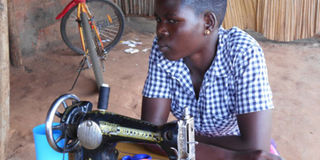LRA survivors can now dream again

One of the affected girls at her workshop at Mucwini Sub-county in Kitgum District on April 10. PHOTO BY BILL OKETCH
Kitgum- In 2003, Filder Atii’s life changed forever. The Lord’s Resistance Army (LRA), whose leaders claim to live by the Old Testament’s Ten Commandments, launched an attack for the tenth time on their village in Mucwini Sub-county, Kitgum District in northern Uganda.
On this occasion, Ms Atii’s cattle were stolen and the family’s few possessions were looted. Twenty-seven children were abducted and 47 villagers including Filder’s parents were killed.
“After the death of my parents, my life was subjected to enormous suffering. For example, I had no one to pay my school fees. And again food was not there for me. I did not have enough clothes. Sometimes I could buy one cloth in the whole year, especially around Christmas,” she says.
Ms Fiona Anirwoth, just like Atii, has a long story of pain. As a result of the trauma caused by the LRA war, she found herself in early child marriage.
“After dropping out of school, I used to do petty things which were not bringing me more income,” she says.
Ms Anirwoth shares her story with Judith Opakrwoth, who grew up under the care of her grandparents in Nebbi District, West Nile.
“My father died when I was still an infant, my mum died when I was seven years old and it was my grandparents who brought me up.
When I joined Ordinary Level, things were a bit hard because getting school fees was difficult for my grandfather,” she says.
However, for the past four years, Oparwoth’s story has changed. She is among hundreds of girls who have benefited from the second chance education for conflict-affected girls project funded by Global Fund for Children (GFC).
After being supported by the programme, Ms Opakrwoth completed Advanced Level. Currently, she is studying at the National Teachers’ College – Muni in Arua District.
“I know at this level, things are better off and by next year, I will be out as a professional teacher and I will be able to teach and raise my own income,” Ms Opakrwoth says.
Mr John Silco, the executive director of Rwenzori Information Centre’s Network, (RIC-NET), notes that if war survivors are not supported, they cannot live a better life.
He says GFC supported seven grassroots organisations in Uganda to scale up and deepen their impact to reach more conflict affected girls in Rwenzori, Acholi, Lango and West Nile sub-regions.
Today, the conflict-affected and marginalised girls supported by the programme are engaging in community development. For instance, some are working in education centres, where they are educating the uneducated.
“Hope and Peace for Humanity picked me from nowhere, they educated me after completing my training, I opened my salon where I’m getting money, I’m able to support my family,” Ms Fiona Anirwoth says.
Ms Sarah Tuyiramye, a Congolese refugee now a bursar at Refugee Aid and Action- Uganda Nursery and Primary School, Kyangwali in Kikuube District, says her hope of going back to school had faded away.
Mr Peter Ogenga Abwola of Kitgum-based COW Foundation agrees.
“You cannot believe that some of these children lost hope in life completely but when we supported them, we were able to give them a second chance to see that yes, they really have hope…. and indeed we have seen the dreams of these girls came true,” he said.
Ms Kandy Alum, a project officer with Foundation for Inclusive Community Help (FICH), remarks: “When we enrolled them for second chance education, they were able to come out with dreams, they were able to know the career they hoped for and right now we have business owners among them, we have teachers among them, we have mentors among them.”
Ms Victoria Anyango, a beneficiary, says: “At first, I thought I would not make it in life but then when FICH came in with all the materials that they were providing me, they changed my attitude a lot towards life. I was able to finish my education. As I talk I have a Bachelor’s Degree in Entrepreneurship and Business Management.”
Mr Godfrey Canwat, the executive director of Hope and Peace for Humanity, says under the education programme, girls are given the opportunity to access the education.




